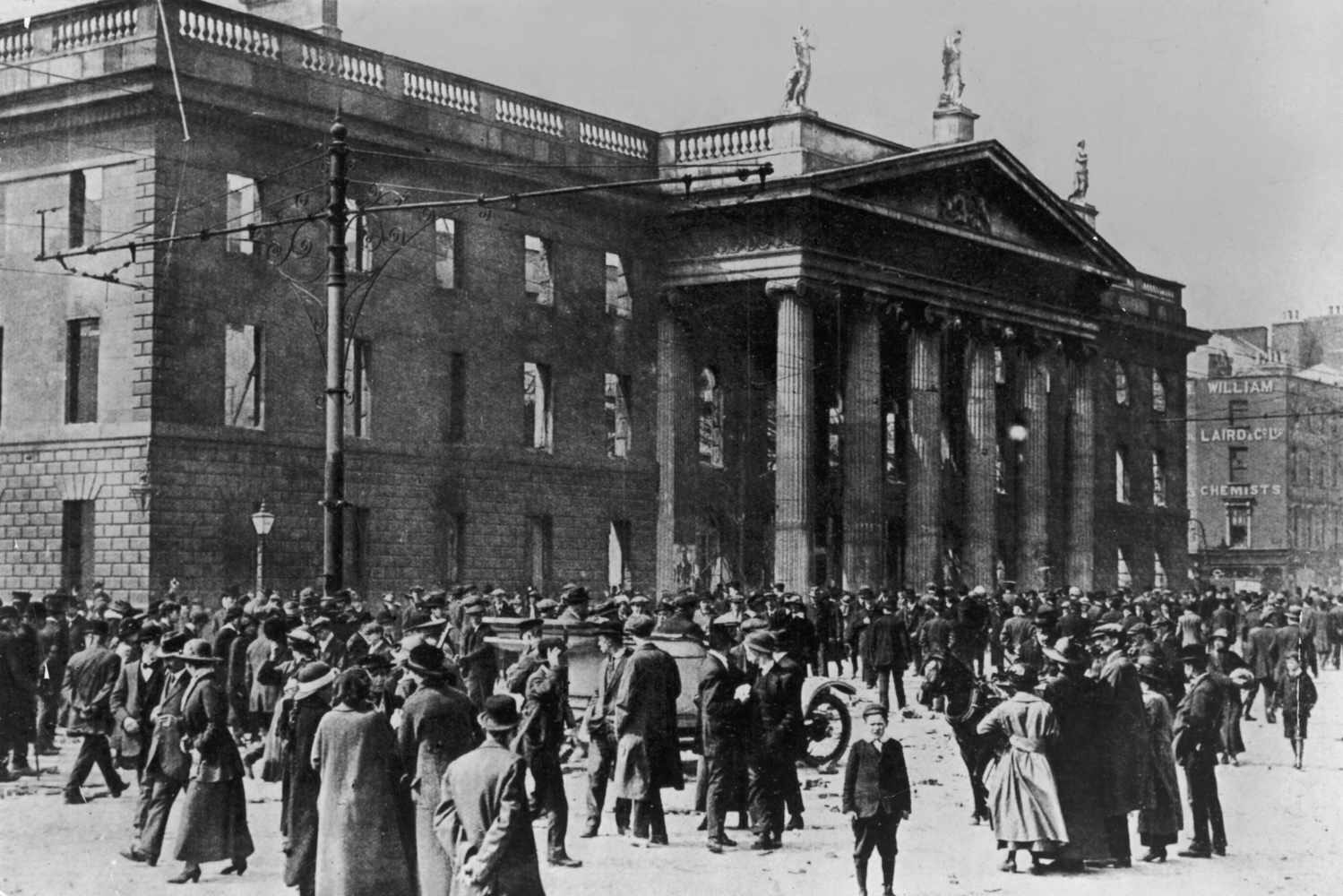Eoin Griffin writes about the history of May Day and how we can use this focal point to reassess our own goals. The blog would like to draw attention to two very important events happening next week. On Monday the 29th of April our friends over at 1913 Unfinished Business are hosting a public meeting at 7pm in Wynn’s hotel on Abbey St. in Dublin under the title “We’re not leaving – Public meeting of young people to fight forced emigration”. Learn more about that here. Then on Wednesday DCTU’s May Day march will leave Parnell Square at 7pm. What was it Oscar Wilde said about socialism and evenings?
May Day holds a mythical position among the international workers and union movements. Its origins can be traced back to Australia in 1856 when stonemasons and builders in Melbourne downed tools on the 21st of April and marched on Parliament to demand an eight hour working day without any deterioration in pay. In 1884 the Chicago Labour Movement adopted the eight hour working day as their core demand, declaring that May 1st 1886 would mark the beginning of the 8 hour working day being a standard. They famously campaigned for this using the slogan “eight hours of work, eight hours of sleep, eight hours of recreation”. This slogan had first appeared in the UK during the Industrial Revolution.
On Saturday May 1st 1886 workers in 12 000 factories throughout the United States went on strike. Estimates vary widely as to how many workers were on strike with figures between 200 000 and half million being disputed. Chicago was the centre of the Labour Movement in the USA and it saw between 30 and 40 000 workers on strike. A Chicago paper reported that “no smoke curled up from the tall chimneys of the factories and mills, and things had assumed a Sabbath-like appearance.” The first day passed off without any trouble and workers held the first May Day parade in Chicago’s history, with the procession being lead by Albert and Lucy Parsons. They proudly chanted, “Whether you work by the piece or work by the day, Decreasing the hours increases the pay” as they marched up Michigan Avenue.

Both May the 1st and 2nd passed off peacefully but on the 3rd of May clashes between locked-out workers and police occurred. At the McCormick Harvester factory police were guarding both the entrance and exit to protect “scabs” who had taken the place of the 1 400 workers on strike. As the “scabs” were leaving the factory that night clashes erupted, these culminated in police charging at the protesting workers. Four workers were killed and sixteen were seriously injured. News spread quickly and the German-language anarchist newspaper Arbeiter Zeitung printed and distributed leaflets urging workers to assemble at Haymarket Square the following day, the 4th of May, to protest against the police brutality.
On the morning and afternoon of the 4th of May there were sporadic clashes between Chicago police and strikers who had assembled on the city’s streets. The Mayor of Chicago permitted the workers to hold their protest meeting in Haymarket square and an audience began to assemble from 7.30pm. What followed were impassioned speeches by Albert Parsons, August Spies, and Samuel Fielden. Just as Fielden was drawing his speech to a close the peaceful demonstration was interrupted by 200 police officers who had marched from the local station. Just as they arrived in the square a make shift bomb was thrown at them, this exploded killing one police man instantly and mortally wounding six more. In the chaos that followed shots were fired from both sides with four workers being killed.
In what later became known as the Haymarket Affair Labour leaders Parsons, Spies, Fischer, and Engel were hanged for “conspiracy”, and other militant leaders of the Chicago Labour movement were imprisoned. Parsons gave a passionate speech from the dock in which he declared that the working class, “possess nothing but their empty hands. They live only when afforded an opportunity to work and this opportunity MUST BE PROCURED FROM THE POSSESSORS of the means of subsistence – capital – before their right to live at all or the opportunity to do so is possessed”. Following conviction and as he faced his fate on the gallows August Spies adamantly declared “the day will come when our silence will be more powerful than the voices you strangle today.”
When May Day was celebrated again in 1890 it had become a truly international affair with workers taking the opportunity to fight for better working conditions across Europe and the US. Yet where does May Day stand in an Irish context? Clearly our economic and social conditions are vastly different to those of both Europe and the USA in the late 19th century. The Irish economy is presently heavily dependent on intangible goods. It would seem obvious that our current crisis, while severe, follows a well worn path of boom and bust that has plagued the country since its foundation.

May Day presents us with an opportunity first for a celebration of the victories that have been won, but secondly and more importantly in the current crisis it can provide a focal point for a period of reflection and growth. As we face into our 6th year of austerity it must be noted the lack of a legitimate coherent alternative being offered by any political group in Ireland.
With the recent rejection of Croke Park II we could be seeing the beginning of the end of social partnership. Or, instead is it could be the dying breath of any form of resistance, with the rejection followed by union posturing. Social Partnership was introduced in 1987 and some claimed it to be one of the most important contributing factors to our “economic success”. Yet we have been propelled into a situation of unparalleled uncertainty. With emigration reaching levels not recorded since the famine and a junior coalition party coming under increasing pressure the time is now fertile for the left to make itself relevant and offer an alternative to the current crisis.
It is becoming obvious that the growing disquiet across the country needs a focus. On the 13th of April 8 000 people took to the streets of Dublin to protest against the Property Tax. This followed on from the mass non-payment of the Household Charge last year. With promises of further cuts to expenditure planned for the next two budgets it would seem we have reached another cross-road in the post Celtic Tiger narrative. The only fear being that there might not be many more.

